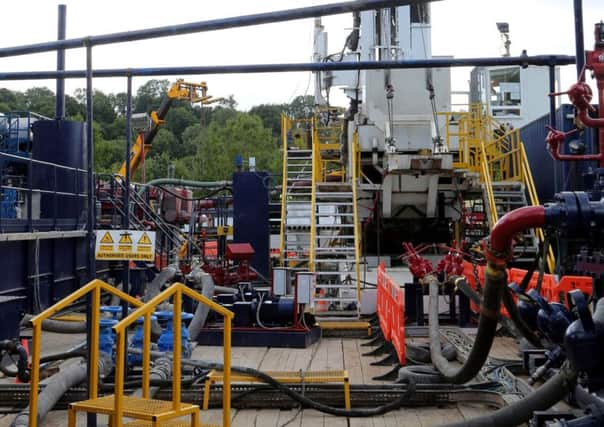Planners throw out two fracking site proposals


A report by planners recommends Lancashire County Council refuse planning applications from shale company Cuadrilla to develop two new sites between Blackpool and Preston to explore for shale gas by drilling, fracking and testing the flow of gas.
The council’s development control committee is due to make decisions next week on the planning applications for the two sites, at Preston New Road, near Little Plumpton, and Roseacre Wood, near Roseacre.
Advertisement
Hide AdAdvertisement
Hide AdThe recommendations were welcomed by campaigners, who called on the council to protect communities from fracking, which involves pumping water, chemicals and sand at high pressure underground to fracture shale rock and release gas trapped in it.
But if the council takes the advice of its planning officers and turns down the applications, it will be seen as a major blow to efforts to get the UK’s shale gas and oil industry off the ground.
The Government is pushing for the development of a shale industry in the UK, claiming it would create jobs and growth, reduce energy prices and cut the country’s reliance on gas imports.
However, opponents have raised fears that fracking causes earthquakes, can pollute water supplies, and could lead to inappropriate development in the countryside and damage house prices.
Advertisement
Hide AdAdvertisement
Hide AdThere are also concerns over the impacts for the climate of exploiting more fossil fuels.
In their report, the planning officers said shale gas exploration was in principle “acceptable”, and the impacts on air quality, greenhouse gas emissions, landscape, water resources and seismic movements at the sites were low or could be controlled.
But the proposed developments, which would have 24-hour drilling operations running for months at a time, would lead to “significant increase in night-time background noise levels”.
“Consequently it is likely that this would have significant adverse effects on the health and quality of life and lead to an unacceptable loss of residential amenity” to people living nearby, the report says of each site.
Advertisement
Hide AdAdvertisement
Hide AdThe planners recommended Preston New Road and Roseacre Wood applications both be refused on the grounds the developments would “unnecessarily and unacceptably” cause harm to residents through noise pollution.
For the Roseacre Wood application, the planning officers also said it should be refused on the grounds of the impact of increased traffic, raising concerns it was in a “very rural location” served by small country lanes.
They said: “An assessment concludes that the increase in traffic, particularly HGV movements, would be severe, there would be a material impact on existing road users, particularly vulnerable road users and overall highway safety of which the potential is considered severe.”
Lee Petts, spokesman for the North West Energy Task Force, a coalition of more than 500 businesses and academics, said: “Natural gas from North West shale could be a massive opportunity for growth, investment, jobs and revenues in our region.
Advertisement
Hide AdAdvertisement
Hide Ad“Today’s announcements are obviously disappointing, but we await the decision of the development control committee next week, and call on councillors to grasp this opportunity to create the jobs and investment that Lancashire badly needs.”
But environmental campaigners hailed the recommendation to turn down the applications.
Greenpeace energy campaigner Simon Clydesdale said: “Many thousands of people in Lancashire are seriously worried about the potential risks of fracking - traffic, noise, water contamination, air pollution, the value of their homes, to name just a few.
“The concerns about noise and traffic brought up by the planners are a reminder that fracking could be a lot of pain for very little or no gain for communities in Lancashire.
Advertisement
Hide AdAdvertisement
Hide Ad“The council now faces a clear choice: They can listen to the planners, and the Lancashire residents that elected them - almost two-thirds of whom want a moratorium on fracking - or they can kowtow to the corporate and political interests keen to force through fracking at almost any cost.
“The whole country is looking to Lancashire to protect its communities from the unnecessary risks that fracking plays with our futures.”
Friends Of The Earth’s North West campaigner Helen Rimmer said: “We are delighted that the planning officers have recognised the serious effects that these developments would have on neighbouring residents and have recommended that Lancashire County Council refuses these applications.
“Councillors must now act on this and the tens of thousands of objections they have received and reject Cuadrilla’s fracking applications next week.
Advertisement
Hide AdAdvertisement
Hide Ad“Only by doing so will they ensure that fracking is not allowed to cause further climate change while also putting communities and the local environment at risk.”
A spokesman for the Department of Energy and Climate Change said: “This is a matter for the local planning authority to determine. The Government cannot comment on a live planning application.
“The Government continues to support the development of the shale industry in the UK.”
Cuadrilla’s chief executive Francis Egan said the report from the planners was a “setback but certainly not the end of the road”, with the concerns limited to one or two issues at each site.
Advertisement
Hide AdAdvertisement
Hide AdHe told the BBC: “Clearly we believe we have already complied with the planning guidance, which is why we’re surprised by the planning officers’ views on noise and traffic.”
He said the company would look in detail at the issues, but added: “I expect we can deal with them.”
“Lancashire County Council planning committee has to take a decision on these issues next week. If they turn down the applications we would have to consider whether we would want to appeal that decision,” he said.